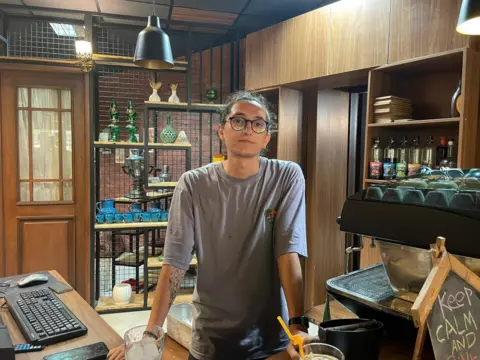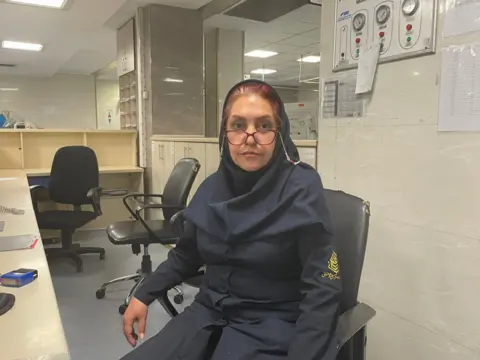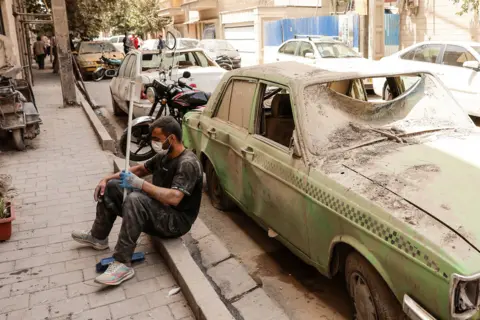
Supreme International correspondent
In the center of the Iranian capital, BOOF CAFE offers refreshing cold drinks on hot summer days.
They must be the most unique iced Americano in this city. The cafe is sitting in the corner of the long and long American embassy.
Since the Iranian revolution and hostage crisis in 1979, Washington’s relationship with Tehran has been broken, and the high cement wall has been plaster as anti -American murals.
At an attractive BOOF cafe, Amir Barista says he wants to improve between the United States and Iran.
“American sanctions harm our business and it is difficult for us to travel around the world.”
A woman covered with a long, black veil occupies only one table, and the other chases the rules that a woman should wear when a woman wearing a long, blue jeans with her boyfriend hugs with her boyfriend.
This is a small snapshot of this capital when facing the small future of this capital.
 Charlotte Scar/BBC
Charlotte Scar/BBCThe recorded speeches of the Supreme Court Ayatollah Ali Khamenei, who are close to the car by car from the complex of Irib, Irib, were broadcasted nationwide on Thursday.
“Americans are opposed to Iran’s Islamic Republic from the beginning,” he declared.
Ayatollah, 1986, said Israel had a shelter to the bunker, saying, “The key is to surrender.”
We saw his speech. Since President Donald Trump suddenly announced a ceasefire on Tuesday, he has announced a truce on the vast part of the IRIB compound. All of Le A is a carbonated skull of steel.
When the Israeli bomb hit the complex on June 16, the fire was swept through the main studio that would have broadcast the address of the best leader. Now it is just ash.
You can still taste the smell. All TV equipment, such as cameras, lights, and tripods, is an tangle of twisted metal. Crunch glass carpet covers the ground.
Israel has accused the journalists who have been rejected by the journalists for the aim of the propaganda weapons of the Republic of Islamic Republic.
Its gap bark seems to symbolize Iran the darkest time.
It can also be found in urban hospitals that treat Iranians who were injured in Israel’s 12 -day war.
Ashraf Barghi says when she works as a chief nurse in the emergency room of the Taleghani General Hospital room, he “I’m afraid that they will attack again.”
“We do not believe that this war is over,” she said with a remark that reflects the fierce worry that she has heard from many people in the city.
On June 23, when Israel bombed the threshold of nearby Evin prison, soldiers and civilian casualties rushed to the emergency ward of Barghi nurses.
“The injury was the worst for 32 years as a nurse,” she was still noticeable.
The strikes for the infamous prison, which Iran modified most political prisoners, were described as “symbolic” by Israel.
Netanyahu Netanyahu seemed to strengthen the repetitive message about Iran’s Iran.
“Israel says that it has only reached military and nuclear prison, but all lies.” He worked at the Ministry of Transportation and Transportation when the missile hit the building. He shows injuries to his arms and back.
Soldiers are taking care of in the ward next door, but we cannot enter there.
 Charlotte Scar/BBC
Charlotte Scar/BBCIn this huge big city, Iranians calculate this confrontation cost. Recently, the government’s health department was killed and almost 5,000 people were injured.
Tehran slowly returns to life and at least resumes the old rhythm on the surface. The infamous traffic began to fill the streets next to the rapid highway and trees.
Beautiful bazaar shops are being reopened as people return to the city that fled to avoid bombs. Along with the US attack on Iran’s major nuclear lands, many people in Israel’s 12 -day military operations were shaken by many people.
“They were not a good day,” said Mina, a young woman who breaks up immediately when she tries to explain sorrow. “It’s so painful.” She shed tears. “We worked hard to live a better life, but we can’t see the future these days.”
We met on the land of the rapid white marble Azadi Tower, one of the most symbolic landmarks in Tehran. In a warm summer evening, many crowds were shaken by the tension of many loved patriotic songs at the outdoor concert of the Tehran Symphony Orchestra. It was still to bring some calm to the city at the edge.
 AFP
AFPPromotors and critics of Iran’s office rulers gathered together by worrying about their future.
Ali Reza said, “You have to listen to what people say.” “We want greater freedom. That’s all to say.”
There is also a challenge. HAMED, an 18 -year -old college student, said, “We must do what we say.
Despite the rules and restrictions that have long dominated their lives, Iranians tell their minds when they wait for the next step by rulers, Washington and other leaders.
Additional report of Charlotte Scarr and Nik Millard.
LYSE DOUCET can be reported in Iran on the condition that no report on the BBC’s Persian service is not used. This law of Iranian authorities applies to all international media institutions operated in Iran.











